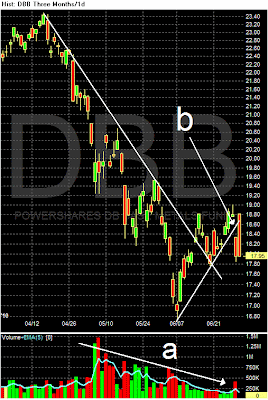- by New Deal democrat
First, the Really Bad News: the
NAR reported that new home sales cratered, falling from 450K to 300K on an annualized basis. Meanwhile, existing home sales fell slightly from 5.79M to 5.66M on an annualized basis. They will crater in turn next month.
This bad news is only augmented by the
MBA mortgage indexes for the week ending June 18. The Market Composite Index declined 5.9%, the Refinance Index declined 7.3% and the seasonally adjusted Purchase Index declined 1.2%, all compared with the previous week. by 1.0 percent. This index is back to its housing crash lows of 2 weeks ago. (Side note: a commenter asked me what I thought of ECRI's long leading index going negative. Since we know that the MBA index is part of ECRI's separate index - and apparently a fairly big part - this tells us that if mortgage applications don't improve, we will have a double-dip, at least for one quarter. It all depends on whether the new home market bounces back from this low, or flatlines.)
Since housing is a pre-eminent leading indicator, the ongoing steep decline mortgage applications is not good at all. For the icing on the cake, Congress told the states and the jobless to go somewhere and die -- the last of 5 indicators of a possible double-dip coming in negative. I agree with Bonddad that this is one of the stupidest things the Congress has ever done.
In other news, the final estimate of 1st quarter GDP was revised lower, from 3.0% to 2.7%. Durable goods orders also fell -1.1% (well within the range of noise in this series), while core capital goods rose by 2.1%, showing that manufacturing is still the engine of the growth we do have. Consumers reported more confidence than at any point since January 2008 in the University of Michigan survey.
Edmund's prelimary estimate of June 2010 new vehicle sales is for a 16.6% increase from lasst year but a 9.5% decrease from May, at 11.2 million vs. 11.6 last month. Jessica Caldwell, the spokesperson for Edmunds.com blamed the decline on March's incentives! I'm a little skeptical of that, given the good performance of May in particular.
Turning to the other weekly indicators:
The
ICSC reported same store sales for the week ending June 19 were up 2.5% YoY but down -0.5% WoW as the summer doldrums set in. This series has been up between 2.5% to 3.0% YoY for the last month. Meanwhile,
Shoppertrak reported YoY sales increased 4.6% and also up 11.0% WoW. Whether these generally good numbers get translated into an improved Census Bureau Retail Sales reading for the month of June remains to be seen.
Gas increased for the fist time since the end of April, up $.04 to $2.74. The 4 week average of usage is very slightly ahead of last year.The price of a barrel of Oil remained at about $76/barrel as of Friday morning, up less than 10% from a year ago. It remains disconcerting that, despite the Euro remaining near its multiyear lows, Oil has nevertheless made up about 50% of its decline from nearly $90/barrel.
The
BLS reported 457,000 new jobless claims this week. I continue to suspect that the continuing elevated level of layoffs consists of construction jobs post expiration of the housing credit, and state and municipal workers. Laid off Census workers may also now be contributing to this total.
Railfax showed an improvement in cyclical and intermodal loads this week, mainainting the advance compared with last year.
Weekly
M1 and
M2 were both down to 4 week lows. M1 is still up about 3% YoY in real terms, and "real" M2 most likely remains ever so slightly positive.
Finally, let's turn to the good news. First, the
American Staffing Association reported that for the week of June 7–13, 2010, temporary and contract employment increased 1.96%, pushing the index up one point to a value of 90. This leading employment index continues to point to good news on that front.
Secondly, the
Daily Treasury Statement continues to show strong gains vs. last year, 17 days into June. For the month, this year we have $115.2B paid in withholding taxes compared with $106.3B last year,
a gain of $8.9B, or 8.5%. For the last 20 reporting days, withholding taxes for 2010 are $125.4B vs. $118.2B a year ago, a gain of 6.5%. Since this very strong showing in payment of withholding taxes coincides with over 200,000 layoffs of census workers (only about 2/10 of 1% of the workforce), it will be very interesting to say the least how June nonfarm payrolls plays out. A strong upside surprise certainly looks possible.
In summary, we have very bad news in a big leading indicator, but good news in the most important coincident indicator of jobs.
Have a nice weekend!











































